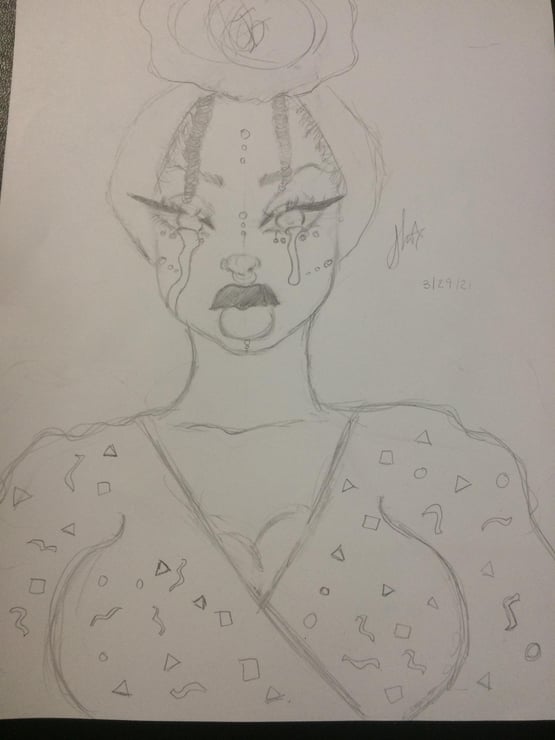In this blog post, Ontario educator, Uthish Ganesh, discusses how he set the foundation for the deep and complex subject matter in the African Diaspora course by focusing the first unit on building community, centering an equity approach and creating space for identity affirming activities. This process created necessary space to explore the layers of identity and its interplay with society and build bridges of commonality, understanding and empathy between students of all backgrounds.
A fundamental pillar in my teaching philosophy is to co-create material with students and establish a learning culture where students’ interests, passions, and identities are championed. This year I had the privilege of teaching the Grade 12 African Diaspora course.
Throughout the course, we discussed the impact and global influence of the African Diaspora as we established connections to how the Diaspora is present in Canada and within the school itself. Winston Churchill Collegiate Institute is home to one of two Africentric secondary programs in the Toronto District School Board. The African Diaspora course had students from the senior Africentric cohorts as well as students from the mainstream program, and our goal was to create and enhance meaningful connections to the subject matter that was discussed.
We recognized that the subject matter of African nations’ experiences of colonization and independence, and the history of the diaspora deserved to be studied. The class used a reflexive positioning exercise that would eventually set the tone for how the class would critically analyze historical events, as we co-created the criteria to answer the question, “What is historically significant?”
Reflexive positioning requires the individual to step back and analyze the world around them. The positioning includes reflection on the outcomes and consequences of meaningful moments, to arrive at conclusions that give insight into beliefs and statements that are driven by their lived experience.
The task emphasized students as the historians and members that define what events are historically significant and relevant. To enhance the personal investment in the course, students were asked to reflect on their personal experiences and victories, which were set to further legitimize their histories, as students began to frame their episodes within the context of Peter Sexias’ Historical Thinking Concepts. The Thinking Concepts’ activities were designed to enhance a sense of community with the class, including students who were remotely learning during this time, and to provide the foundational exploration into the concepts of identity and how identity is navigated through society. An additional goal was to have this built-in understanding before students integrated historical pieces of evidence into the histories of colonization, independence, and the Diaspora.
This unit was also influenced by Facing History’s Stories of Identity, as students contextualized their experiences in relation to their living experiences in Canada or through the African diaspora in Canada. I used the Stories of Identity framework to recognize the importance of interacting with others. The chapter “Understanding Strangers” aligned with the classroom philosophy of building off of our histories and significant moments; the goal was to enrich our worldview through mutual understanding and respect for our peers, which we accomplished together.
Students were re-familiarized with the Historical Thinking Concepts and began to expand their understanding of the Concepts by drawing concrete examples from their lives that met the co-created criteria.
Students were initially asked to identify a significant moment in their life and plot on a continuum of globally significant, nationally significant, regional significant, individually significant, or not significant at all. After students began to place and justify the level of significance, students had to further complicate their events by analyzing the ethical implications of the events, the lasting changes and constants, the indirect and direct causes and consequences.
During the process students were also given multiple options to communicate their findings, which include the following: an essay, podcast, short film, and visual representation with a write-up explaining their visual.
Students who took up the opportunity to include a visual with an explanation found benefits in sharing their work. The image below is a student drawing which represents the globally significant event of Ghana being taken advantage of during colonization. The student’s artwork illustrates a Ghanian woman taking on a mother-like role and is afraid of what the future will hold for their children because of the impact of colonialism. The student wanted to emphasize the lack of control that would be felt during this time, as they used a podcast format to explain the ethical dilemmas that occurred and the outcomes that followed.

The outcomes led to rich responses, as students focused on their identities within the context of the diaspora as many reflected on their current livelihoods in Toronto, relationships with law enforcement, adjusting to loss of family and friends, and personal accomplishments. Students within the Africentric cohorts also reflected on their identities and the living diaspora in Canada as some focused on their families’ immigration experiences.
The outcomes heavily contributed to the success of students’ abilities to critically analyze the subject matter that we investigated throughout the course. As the class understood what met the co-created criteria of historical events, students were able to develop meaningful relationships with the subject matter and the first-hand accounts of civil leaders, resistance movements, and case studies of nations. Positive feedback from students showed students appreciated the moment to reflect on their own experiences, as the course transitioned from their living histories to subject matter that would connect to their identities.
Student’s feedback about what they found most useful or valuable ranged from the following
- “I think in my personal life, learning about what other races had to go through and deal with will help me understand and appreciate one another”
- “This history is important”
- “The history of our ancestors I could use for college”
- “My history that I learned about”
- “My knowledge on the Afircan Diaspora can help me in future classes (the Black literature class I plan on taking in the summer)”
With students recognizing their own personal experiences in a social and historical context were valid and significant, this understanding helped contribute to the following course material and structure. Students were able to make deeper connections to the humanity and complexity of leaders, activists, and individuals whose experiences we studied, which further motivated their understanding of the historical tenors and contexts of individuals in the African diaspora.
As this was a newly taught course at Winston Churchill Collegiate, I am thankful for my mentor Principal Nicole Aloise for giving me the opportunity to teach this course, on top of providing me leadership roles to focus on equity-based initiatives at our school over the last three years. I am also thankful for the guidance of my two department heads, Dayo Baiyewu and Karen Savage for their support early on when I was collecting material and resources for the class. Their confidence in me was necessary as it helped ensure that the learning and reflexive culture that we aimed to establish was fulfilled.
If you would like to stay informed about the equity-based initiatives that I lead at Winston Churchill CI feel free to follow me on Twitter: @UthishGanesh. You can learn more about the professional development sessions I lead with staff, school-wide initiatives, and specific approaches to support youth. Additionally, if you have any questions or comments you may contact me at Uthish.Ganesh@tdsb.on.ca.

